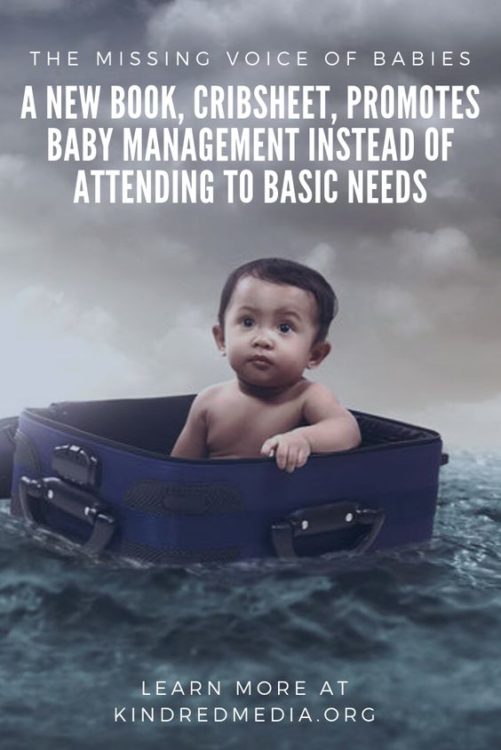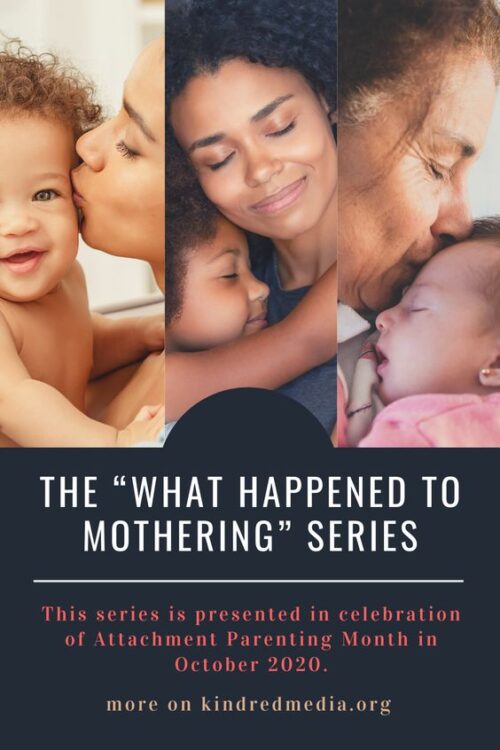Three reasons adults are tough-minded with babies
A worried and frightened grandmother emailed me to ask for advice regarding her 13-month-old granddaughter. The child was very anxious and fearful and had been so for months. She would not let the grandmother put her down, hanging on tightly, even to play with toys, scared she would be left alone. The grandmother discovered that the girl’s mother had been putting her to bed in a dark room, closing the door and leaving her alone for the night. The mother says she is “teaching her independence.” Along with the myth of “spoiling babies,” this is a common rationale parents are given for unkind treatment of babies.
Such treatment is imposed trauma for a baby (who, remember, is like a fetus till 18 months of age; Trevathan, 2011). Cry-it-out (to extinction) sleep training a baby does not teach independence but its opposite, as the example illustrates. A baby that finally stops crying has gone into a parasympathetic self-preservation mode, not “self-soothing” (Henry & Wang, 1998). Instead deep anxiety is being planted in the preverbal mind.
As I’ve pointed out in prior posts (see list below), babies must learn all sorts of things after birth and can only do so in a healthy manner with the constant help of caregivers. For example, 24/7 physical presence and soothing care are critical to help baby learn to breathe outside the womb, to suckle—the first source of self-confidence which grows cranial nerves and skull bones, to properly grow the vagus nerve (which enervates all major body systems). These are some of the critical aspects of the first few weeks. They are followed by months of learning the beginnings of social and emotional intelligences that come from experiences with caregivers of intersubjectivity—the coordinated sharing of emotions and other signals in a communicative musicality (Malloch & Trevarthen, 2009), the vitality contours that are foundational for language learning and a satisfactory social life (Stern, 1999).
A second reason for harsh parenting was provided by psychoanalyst and author, Alice Miller (1983/1990; website ). She contended that those adults who were humiliated themselves in childhood (and never healed) would be insensitive to children’s needs for love and tenderness, and would follow rationales given for being harsh (see below for links to posts describing her arguments).
But I think that parents who are not tender with their babies are guided by something else. They have learned to ‘harden their hearts’ for the ‘good of the baby’ because they have learned that the baby is full of original sin.
The USA has a history of religious convictions rooted in St. Augustine’s notion of original sin. Listen to what the famous preacher, Jonathan Edwards, wrote:
“As innocent as children seem to be to us, yet if they are out of Christ, they are not so in God’s sight, but are young vipers, and are infinitely more hateful than vipers, and are in a most miserable condition, as well as grown persons; and they are naturally very senseless and stupid, being ‘born as the wild ass’s colt’ [Job 11.12], and need much to awaken them.” (Edwards, 1844, Vol. 3, p. 394)
Robin Lane Fox (2015) gives some elucidation of the origins of original sin in his biography of Augustine. He reviews Augustine’s point of view:
“Despite the care and love extended to it, a baby resorts to tears and jealousy. It kicks against its elders and superiors even when they know that its demands are not in its best interest. This behavior is proof indeed that no baby is ever free of sin. Augustine has observed it in others and can assumes it of himself thanks to words of scripture. As the psalmist said, ‘I was conceived in iniquity, and in sins my mother nourished me in the womb’ (Ps. 51.1). In the Book of Job he had read: ‘None is pure of sin before you, not even an infant of one day upon the earth’ (Job 14.4-5). Augustine is enabled to understand his infant self by understanding scripture about that forgotten phase of life. (p. 36)
Augustine compares baby behavior—crying for needed breast milk—with the possibility of the same behavior in an adult and condemns it as reprehensible in a baby because it would be so in an adult.
This reminds me of psychologist John Watson’s (1928) advice to parents to treat babies like undergraduates (i.e., don’t give them too much attention) so they get used to it early and would not be so annoying to him when they became his students. What a mix up of levels and misunderstanding of child development both men displayed. Their uneducated, mindless rationalizations have motivated many a parent to be harsh with their babies, seeding psychological and physical pathology (Karr-Morse & Wiley, 2012).
Augustine also wrote: “A baby’s limbs are feeble as it kicks and strikes out, but its mind is sinful” (Fox, 2015, p. 37)
What is disturbing is that the biographer, Fox, editorializes right after this statement, agreeing with Augustine’s belief that babies minds are sinful. Fox writes: “Few parents in the front line nowadays would disagree” (Fox, 2015, p. 37).
With more expertise about these matters, I can editorialize and say that such uninformed parental beliefs are what lead to the perception of baby unruly “sinfulness” to begin with, rather than the other way around. Ironically, once you start to mistreat a baby, they do become “unruly” (dysregulated). Corporal punishment such as spanking has equal negative effects on child outcomes (Gershoff & Grogan-Kaylor, 2016).
Why do adults harden their hearts against babies?
- Misinformation about baby needs and development
- Their own experience of being mistreated
- They get ideas about sinful, unruly babies from religious authority figures.
The ‘original sin’ of babies, for which they are harshly treated, is to be needy. In a country known to expect toughness over tenderness, the expectation gets transferred to babies too (Suttie, 1943).
RELATED POSTS
- Mother Love Used to Matter
- What Is “Good Enough Mothering” of a Baby?
- Why Provide Empathic Care for Infants?
- Disbelieving the Importance of Mothering
- Evil Babies and Parenting (Alice Miller’s Insights)
- Adult Justification of Child Humiliation and Mistreatment
REFERENCES
Edwards, J. (1844). Works of President Edwards, in four volumes. New York: Leavitt, Trow & Co.
Fox, R.L. (2015). Augustine: Conversions to confessions. New York: Basic Books.
Gershoff, E. T., & Grogan-Kaylor, A. (2016). Spanking and child outcomes: Old controversies and new meta-analyses. Journal of Family Psychology, 30(4), 453.
Henry, J.P., & Wang, S. (1998). Effects of early stress on adult affiliative behavior, Psychoneuroendocrinology, 23( 8), 863–875.
Karr-Morse, R., & Wiley, M.S. (2012). Scared sick: The role of childhood trauma in adult disease. New York: Basic Books.
Malloch, S., & Trevarthen, C. (Eds) (2009). Communicative Musicality: Exploring the Basis of Human Companionship. Oxford: Oxford University Press.
Miller, A. (1983/1990). For your own good: Hidden cruelty in child-rearing and the roots of violence. New York, NY: Noonday Press.
Stern, D. N. (1999). Vitality contours: The temporal contour of feelings as a basic unit for constructing the infant’s social experience. In P. Rochat (Ed.), Early social cognition: Understanding others in the first months of life (pp. 67-90). Mahwah, NJ: Erlbaum.
Suttie, I. (1935). The origins of love and hate. New York, NY: The Julian Press.
Trevathan, W.R. (2011). Human birth: An evolutionary perspective, 2nd ed.. New York: Aldine de Gruyter.
Watson, J. B. (1928). Psychological care of infant and child. New York: W. W. Norton & Co.
About the 28 Days of Baby Care Campaign!
There is a lot of misinformation about babies and their needs, and parents are often encouraged to ignore baby’s signals. Bad idea. Babies are “half-baked” at birth and have much to learn with the help of physical and emotional support from caregivers. Taking care of baby’s needs is an investment that pays off with a happier, healthier child and adult. Here are 28 days of reminders about babies and their needs.





